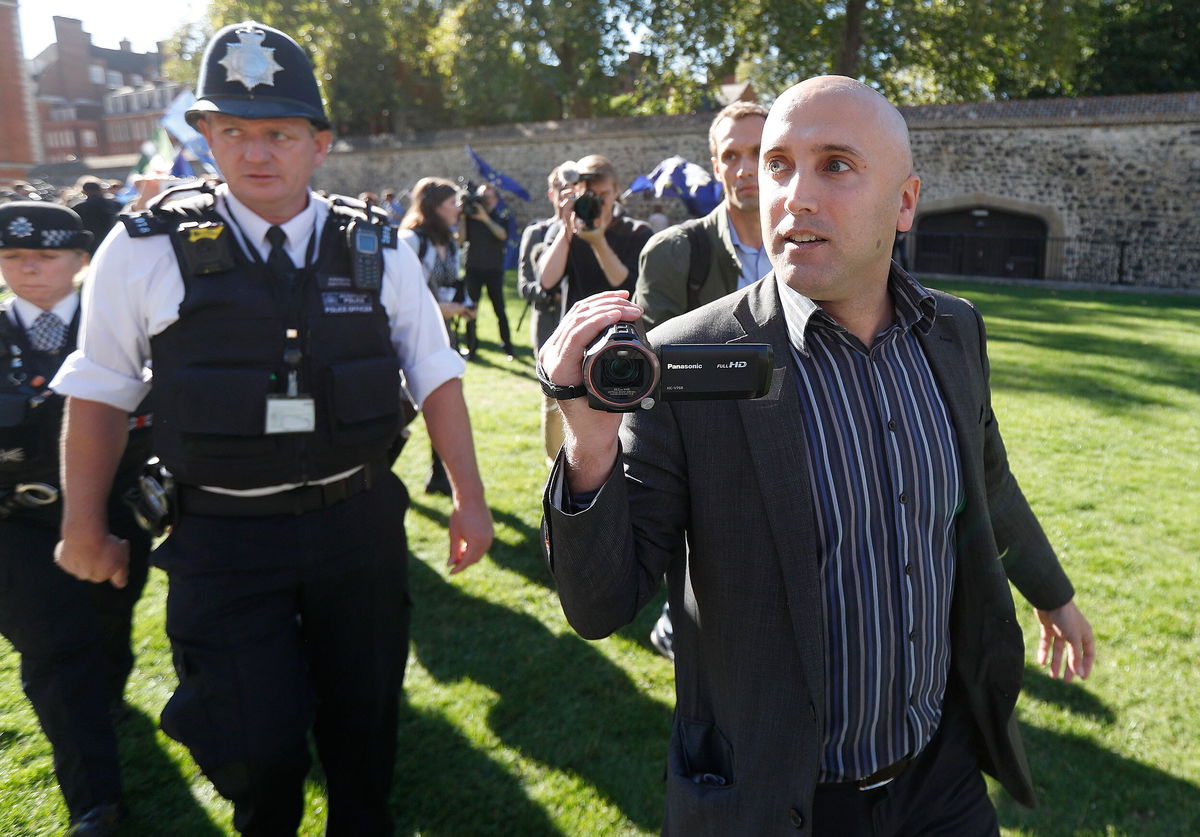UK sanctions British blogger over videos from Ukraine

Blogger Graham Phillips is escorted away by police officers after he disrupted a press conference by Bellingcat founder Eliot Higgins
By Joseph Ataman
The UK government has sanctioned a British blogger over content that it says “destabilizes” Ukraine, according to the British Foreign Commonwealth and Development Office.
Blogger Graham Phillips was added to the UK sanctions list on Monday, according to the Foreign Office. He is the only British national sanctioned in relation to Russia’s invasion of Ukraine, according to public records.
Philips has appealed the decision, describing it as “absolutely absurd, dangerous, ridiculous.”
The British Foreign Office says Philips’ work constitutes “media content that supports and promotes actions and policies which destabilize Ukraine and undermine or threaten the territorial integrity, sovereignty, or independence of Ukraine.”
In a video posted on YouTube on April 19, Phillips questions captured British national Aiden Aslin, who had been fighting with Ukrainian forces in Mariupol. On camera, Aslin says he is not speaking under duress but is handcuffed during the video.
YouTube removed the video. At the time of writing, parent company Google had not provided a statement to CNN on the removal of the video.
On April 20, British MP Robert Jenrick, who represents Aslin’s constituency in the UK, criticized the video in Parliament as a “flagrant breach of the Geneva conventions.”
“Treating any prisoner of war in this manner is illegal and the interviewer Graham Phillips is in danger of prosecution for war crimes. And that any online platform, such as YouTube, that hosts propaganda videos of this kind should take them down immediately,” he said.
In the video, Phillips refers to Aslin as a “mercenary” rather than a prisoner of war.
In response, UK Prime Minister Boris Johnson said of Aslin, “I understand that he had been serving in the Ukrainian forces for some time and his situation was very different from that of a mercenary.”
Phillips previously worked as a contributor for state-owned broadcaster RT in Ukraine and his videos typically present a pro-Russian view on the Russian invasion of Ukraine.
He described the sanctions as “Kafka-esque” on Telegram on July 26.
“It’s pretty Kafka-esque in as much as I’ve not had any chance to defend myself against the charges against me which led to the punishment,” he said.
“But there are no real charges against me which led to the punishment so nothing to defend myself against,” he added. “Just that the British government don’t like my work.”
On Wednesday, Phillips said the sanctions had resulted in authorities, “seizing all my bank accounts without any judicial process,” he said on Telegram.
Later on Wednesday, Phillips said on Telegram that he had submitted an appeal against the British government decision.
“So, after a day with a lawyer I’ve now submitted an official, 4-page appeal against the absolutely absurd, dangerous, ridiculous decision of the UK government to sanction me. And tomorrow, return to work here in Donbass, as normal, since 2014,” he said.
At the time of writing, Phillips had not responded to CNN’s request for comment.
In a statement released by the UK Foreign Office on June 11 following Aslin’s capture by Russian forces in Ukraine, Aslin’s family confirmed that he had been serving as a contracted Marine in the 36th brigade of the Ukrainian Armed Forces. The statement added that he has been a Ukrainian resident for four years.
Following his capture, the Russian-backed authorities in the self-proclaimed Donetsk People’s Republic sentenced Aslin to death for fighting as a “mercenary”, alongside another Briton and a Moroccan citizen.
CNN has reached out to the Luhansk People’s Republic authorities for an update on Aslin’s status. At the time of writing, CNN has not had a response.
The-CNN-Wire
™ & © 2022 Cable News Network, Inc., a WarnerMedia Company. All rights reserved.
